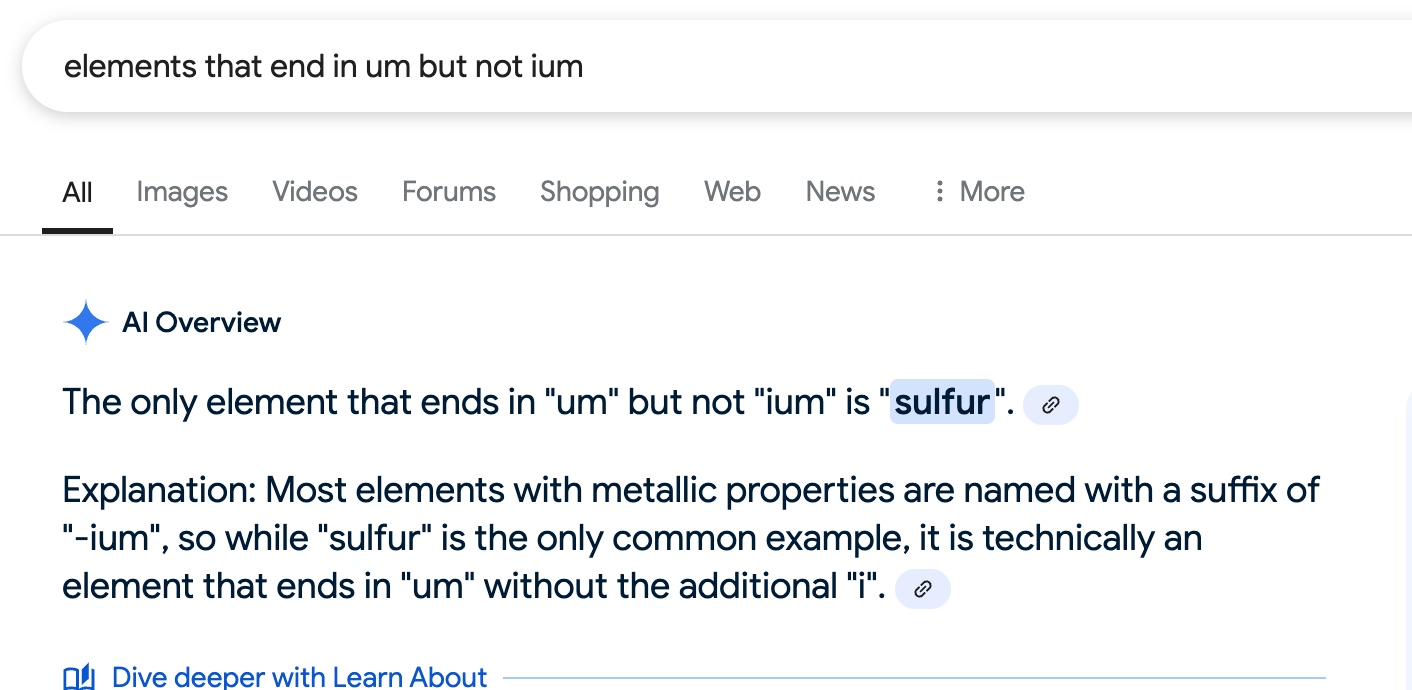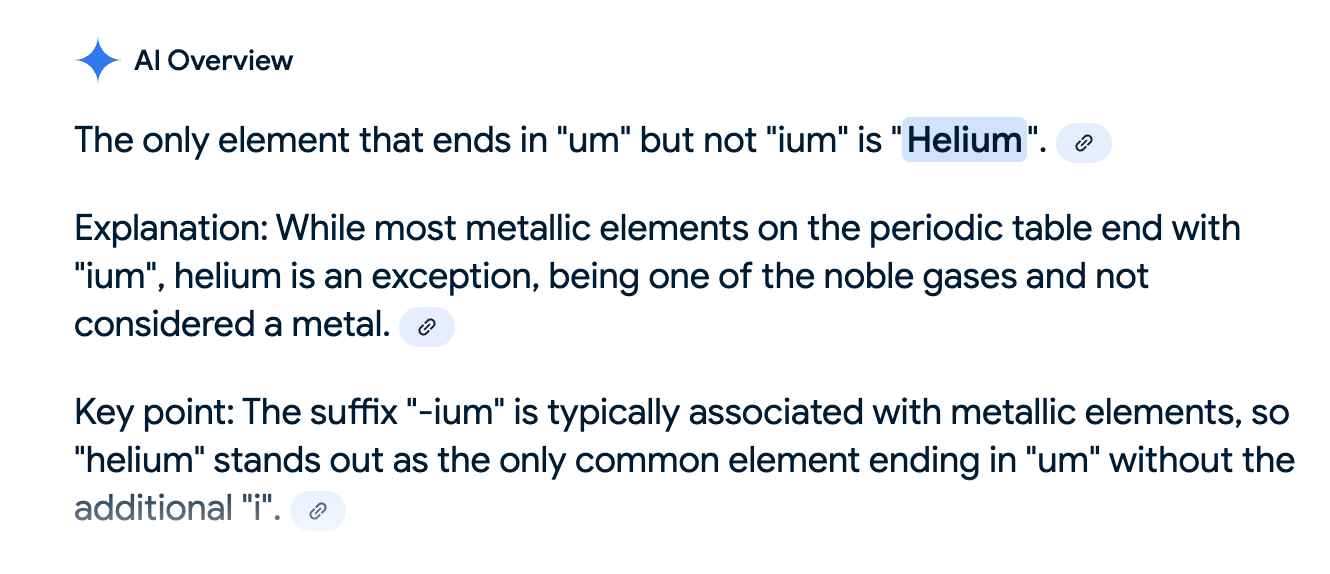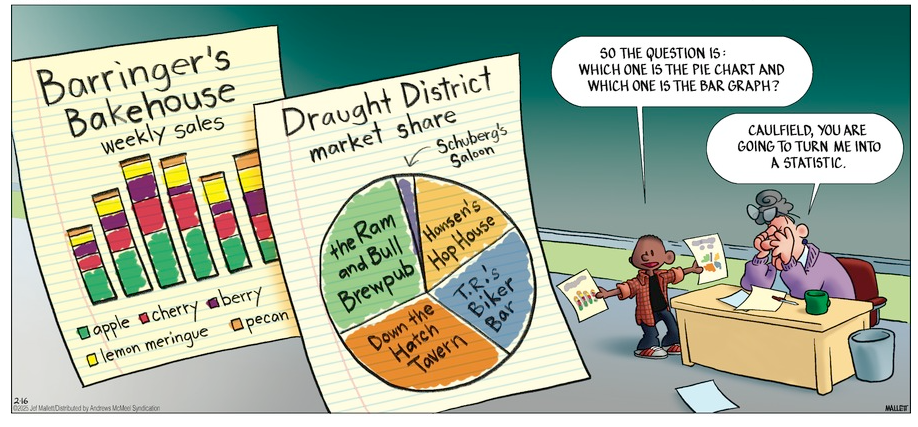Archive for February, 2025
ChatGPT cat wound healing conversation
VHM: This is a dialog held between ChatGPT and TK, who printed it out and sent it to me.
The unretouched dialog, which lasted about 20 minutes, is very long. If you don't have time to read all of it, please look at the last paragraph of this post, where I give my takeaway assessment of the implications it holds for AI.
===================================================
Read the rest of this entry »
AI Overview jokes
There's recently been a minor social- and mass-media fad for weird "AI Overview" answers from Google. The results are a moving target, either because of back-end fixes or because of the inherently stochastic nature of LLM results, but some of them are funny while they last. One query that still works this morning is a request for "elements that end in um but not ium", which sometimes answers
and sometimes answers
Read the rest of this entry »
Japanese "goods" | Chinese "guzi"
The pathways of word borrowings can be absolutely mind boggling. The modern English word "goods" derives from the plural of one of six different roots that resulted in "good". I will not touch upon the five other etyma that resulted in "good" with other meanings, but only on the one that culminated in a countable noun signifying "an item of merchandise", often fixed in the plural form "goods", e.g.,:
-
-
c. 1596–1598 (date written), William Shakespeare, “The Merchant of Venice”, in Mr. William Shakespeares Comedies, Histories, & Tragedies […] (First Folio), London: […] Isaac Iaggard, and Ed[ward] Blount, published 1623, →OCLC, [Act IV, scene i]:
-
Thy lands and goods / Are, by the laws of Venice, confiscate / Unto the state of Venice.
-
-
√Inherited from Middle English good, god, from Old English gōd (“a good thing, advantage, benefit, gift; good, goodness, welfare; virtue, ability, doughtiness; goods, property, wealth”), from Proto-Germanic *gōdą (“goods, belongings”), from Proto-Indo-European *gʰedʰ-, *gʰodʰ- (“to unite, be associated, suit”). Compare German Gut (“item of merchandise; estate; property”).
For two mercantile nations such as England and Japan, it is inevitable that "goods" would be borrowed from English into Japanese. It has its own entry in the Japanese Wiktionary: guzzu グッズ and has found its way into Korean as well: gutjeu 굿즈.
Read the rest of this entry »
Taiwan cares about its indigenous languages
AntC reports:
Earlier this month, I travelled the length of Taiwan's East Coast by train. Every station is decked out with Indigenous art, with the location's name given in both Mandarin and the applicable Indigenous language (Roman script).
Read the rest of this entry »
Suzhou rap sounds like it has a French accent
From Chas Belov:
Google Translate says that this song is in Suzhou topolect (it actually says "dialect" but thanks to you I know better). But I had to recognize a few words before I could convince myself it wasn't in French (which I also don't know). Later in the song it sounds more Chinese, but the rapper never really loses that French sound. Am I imagining things?
【苏州方言RAP】红中 Zyh 《三十三》PROD BY XVIBE
Read the rest of this entry »
ChatGPT does ASMR in Chinese
This morning, I received the following interesting message from Adam C.:
Read the rest of this entry »
The noninfallibility yet utility of AIO
Someone complained in an inappropriate and non sequiturish place that AIO (Artificial Intelligence Overview) did not definitively solve the difficult problem of the seeming non-Sinitic etymology of Japanese waka 若 ("young; youth") that he posed to it.
Cf. Wiktionary:
Japanese
Noun
Read the rest of this entry »
"Age against the machine"
According to Roy Dayan et al., "Age against the machine—susceptibility of large language models to cognitive impairment: cross sectional analysis", BMJ Christmas 2024:
To evaluate the cognitive abilities of the leading large language models and identify their susceptibility to cognitive impairment, using the Montreal Cognitive Assessment (MoCA) and additional tests. […]
With the exception of ChatGPT 4o, almost all large language models subjected to the MoCA test showed signs of mild cognitive impairment. Moreover, as in humans, age is a key determinant of cognitive decline: “older” chatbots, like older patients, tend to perform worse on the MoCA test. These findings challenge the assumption that artificial intelligence will soon replace human doctors, as the cognitive impairment evident in leading chatbots may affect their reliability in medical diagnostics and undermine patients’ confidence.
Read the rest of this entry »
Hiberno-English: it's a soft day
Spending some time in Ireland, I hear people saying "It's a soft day" or "It's a soft day, thank God!". Not knowing what that expression implies, I do a search and find that "A soft day is what the Irish call a very very damp fog or a mizzle, which is a cross between a mist and a drizzle." (source) Mizzle is also the color of a shade of paint. (source)
"Soft day" is a phrase derived from Irish lá bog (lit.) ("overcast day; light drizzle/mist").
That reaction to a moist, overcast day tells you something about the Irish mindset and helps you understand Irish sentiment and humor.
Read the rest of this entry »
Pie charts and bar graphs
Yesterday's Frazz:
Caulfield's joke illustrates several interesting linguistic points.
Read the rest of this entry »




